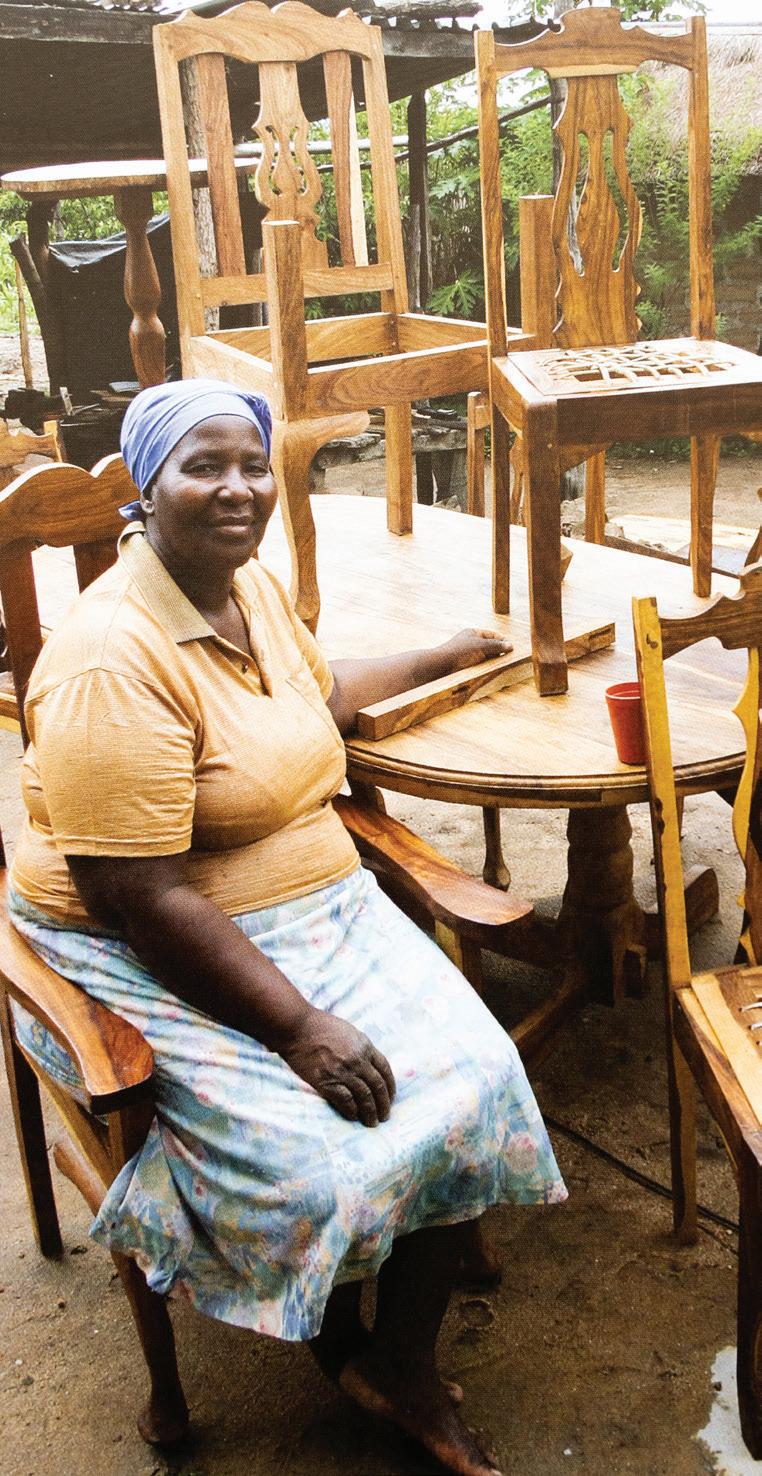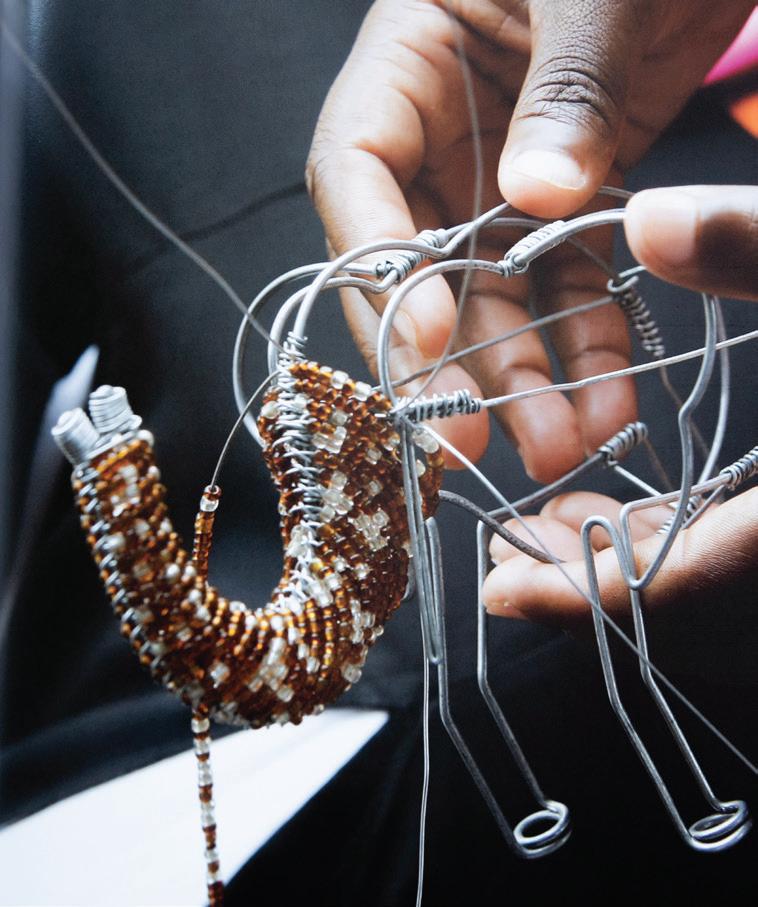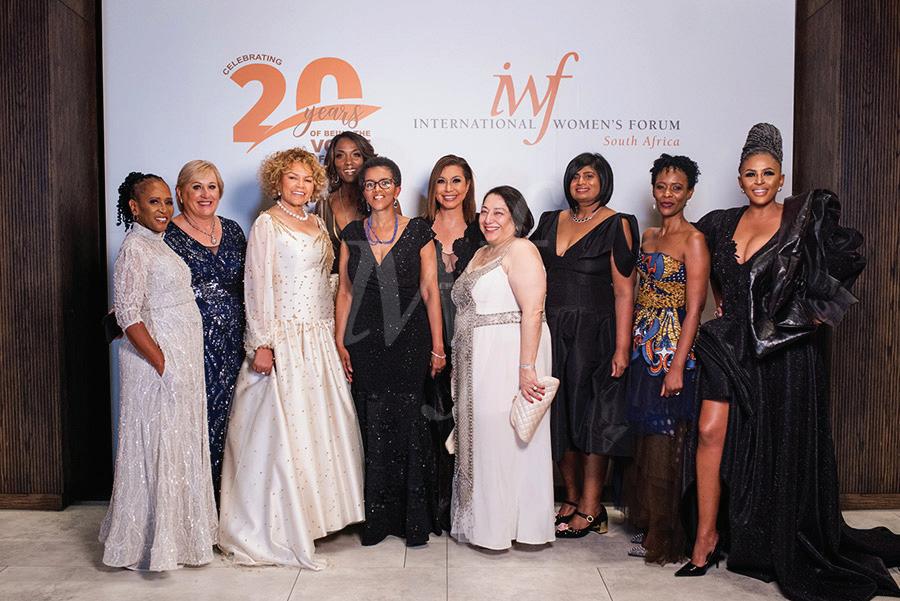
8 minute read
Eradicating poverty and uplifting society through gender equity
Mrs Zanele Mbeki
If there is ever a good example of why Equity and Equality are not the same, it is found in the many projects that Mrs Zanele Mbeki has started and is still involved in to this day. Her tireless work of developing and uplifting women is a testament to her passion and resolve to make a meaningful impact in her continent. She is able to work with all women, from the poorest of the poor who are unemployed to the low-income earners who are under employed, to the middle and upper class of society, thereby showing the depth of her vision. The projects that she has founded since returning from exile cater for all women in society.
Mrs Mbeki was born in Alexandra township. She studied Social Work at Wits University and holds a postgraduate in Social Policy and Administration from the London School of Economics; she held a Social Work Fellowship at The London Institute for Social Work Training and completed her residency for a doctoral degree at the Brandeis University, Heller School for Social Policy and Management. She is married to the former President of South Africa, Thabo Mbeki. Most of her projects were founded prior to her role as First Lady, and she remains actively involved in empowerment projects beyond her tenure. When interviewed by Business Times, she said of her vision “When I returned to South Africa from exile in the early ‘90s, I looked around and, as a social worker, asked myself: why are women in our country being denied access to finance and opportunities to participate in their own business ventures? The idea dawned on me that we should create a vehicle to focus on banking the “unbackable” - women in the most rural and marginalised communities in South Africa. For, if poverty has a face, it is a woman’s face.”
Her pioneering work in establishing the Women’s Development Bank is a case in point. She is also the founder of South African Women in Dialogue (SAWID) and the South African Chapter of the International Women’s Forum (IWFSA), with IWF being a global organisation established in New

York with the aim of connecting women leaders across every professional sector in support of each other and the common mission of advancing women’s leadership and championing equality worldwide. Today IWF is comprised of over 8 000 preeminent women leaders in 33 countries.
When asked how she has raised and supported generations of women, she replied “I’ve done it through not speaking”. Never the one to enjoy spotlight, she immerses herself in her passion of developing women. Mrs Mbeki believes actions speak louder than words and she is happy being referred to as Ma Mbeki although I have gotten accustomed to calling her Sis Zanele from when I started consulting at the Thabo Mbeki Foundation and Thabo Mbeki African Leadership Institute.

Eradicating poverty is a lifelong goal of Mrs Mbeki. Her vision is the overall development of society, with women taking their rightful central space. She recognised that the challenges faced by black women specifically was core to transformation. She had dedicated most of her career to helping poor women to become self-sustainable.
Where did she get her inspiration for WDB?
A strong believer in learning from others, she says she was inspired by Prof Muhammad Yunus and his approach to empowering the poor in his own country of Bangladesh. The Women’s Development Business (WDB) based their programme on Grameen Bank’s philosophy of giving step-up microloans to the poor. In driving her vision, Mrs Mbeki has created the means to support women in the poorest circumstances to achieve the respect and equality she hopes for them. She thus founded the WDB Investment Holdings Company Ltd with the endearing vision to put development resources directly into the hands of the poor.
When listening to Mrs Mbeki’s story and watching the success of the projects she initiated, I cannot help but realise how it is easy to overlook a huge layer of our society when we talk about financing - when we think of a bank loan many of us imagine large amounts of money, however what is powerful about this concept is what she calls the very first WDB Microfinance pilot project that began in 1991 in a smalldrought ravaged South African rural area called Aconhoek. They identified 50 prospective woman clients and lent each of them R300.
It is easy to say that R300 is such a small amount, that it would be easier to simply gift them and allow them to grow from there. But her vision is financial inclusion through instilling dignity, self-sufficiency and pride in the beneficiaries of such loans. She was pleased that three months later, 100% of the loans had been repaid. This gave impetus to her vision and the WDB journey began.


In a country like South Africa which has well documented past and current inequalities and systemic barriers, real empowerment meant doing more than just provide a loan and just wait for it to be repaid. Proper empowerment comes with a responsibility to provide the guardrails to enable success (that is equity at play). This responsibility was in the form of providing various training programmes to assist with basic literacy courses and skills on how to run a small business. Like any other venture, there were many lessons learned along the way. Despite some challenges, Zanele Mbeki’s ongoing empowerment narrative is that “if you put development resources directly into the hands of the poor, they can change their own lives”.
How has the WDB evolved since its inception and what is the overall success regarding financial inclusion?
The WDB Investment Holdings’ role is to promote women business leaders and to create revenue streams in support of the WDB Trust programmes. Trust funds support principally capacity building for development microfinance for women who live in under resourced rural areas as well as link them to development resources; provides them with socio-economic linkages and training. It upscales micro enterprises; supports computerbased preschool literacy and adult literacy in own languages. It is through these kind of grass-roots level projects that the most impact is made to eradicate poverty and inequality.
Mrs Mbeki is also the founder and patron of South African Women in Dialogue (SAWID) which is an independent public benefit trust pursuing advocacy, healing and dialogue among South African women from all walks of life. She actively participates in other forums and trusts, all focusing on social development and gender equality. Describing South Africa as a ‘wounded nation’, Mrs Mbeki believes that we need to heal to enable us to turn our pain into power.
In 2016, after 25 years of driving women’s rural programmes and establishing a successful investment company to finance development activities, she recently set up the Zanele Mbeki Development Trust (ZMDT) which aims to anchor and host annual dialogues of African women in South Africa. The objective is to create a platform for African women of diverse backgrounds to meet and deliberate on common challenges and map out strategies for addressing them, regionally as well as across the African continent. Also in 2016, on the realisation that after 25 years of democracy, very few services directed at the rural poor had been created, the WDB trustees elevated the programmes into Trusts so that they could grow into independent institutions to serve under-resourced communities with appropriate services tailored to their levels and needs.

Under the 2 years of COVID-19 it became clear that the requirements to sustain topheavy structures as required by each Trust was unsustainable. The Trustees agreed to return the Trust programmes back into WDB Trust including ZMDT programmes.
Mrs Mbeki also facilitated the founding of South African Microfinance Apex Fund (SAMAF) by the Department of Trade and Industry, a facility to fund micro finance institutions, as well as the Association of Microfinance Institutions of South Africa (AMFISA), a lobbying platform for the notfor-profit microfinance sector (renamed as Development Microfinance Association (DMA) of South Africa) in which she still actively participates.

My take away lessons from Mrs Mbeki’s leadership
You do not have to always be in front to lead. The most effective way of leading is to propel those who are at the bottom of the economic food chain not only through mentoring but practical, tangible tools for empowerment.
The most effective way of empowering the marginalized poor communities is to put development resources directly into their hands. There is something about perpetual handouts that robs one of their dignity.
Focusing on the poor and the marginalized is great but working with both the privileged and underprivileged provides endless opportunities for a symbiotic beneficial relationship.
Humility is one of the most attractive and impactful qualities of leadership. When you come with such extensive life experience and professional experience like Mrs Mbeki, and yet you are still accessible to all levels of society, that is invaluable. Your light as a leader does not diminish because you passed it on to others.In fact it makes yours shine brighter.










